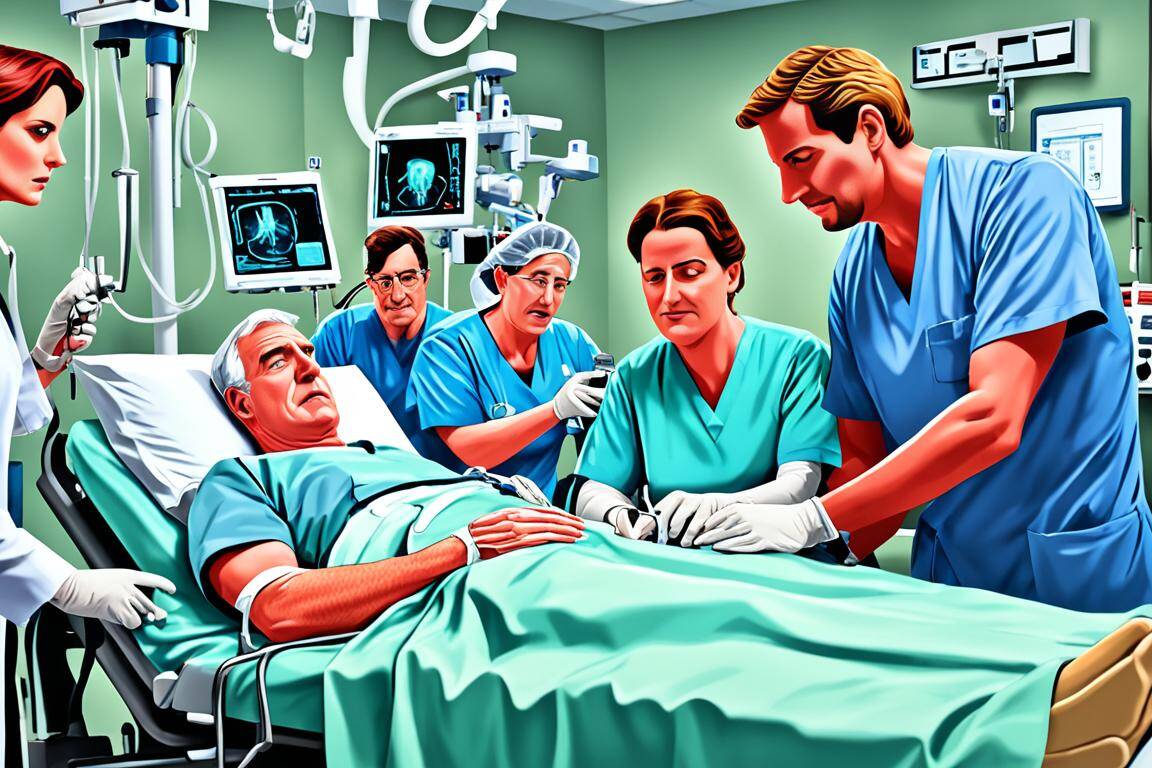Gastrointestinal (GI) bleeding shows a problem in your digestive system. Blood can appear in your stool or vomit but might not always be clear. Black or tarry-looking stool is one sign. Lower gastrointestinal bleeding could be mild or severe. It can also be life-threatening. Signs of GI bleeding vary. It might be easy to spot, called overt, or hard to notice, known as occult. The symptoms change based on how fast and where the bleeding is in your GI tract, from mouth to anus.
Table of Contents
ToggleWhen bleeding starts suddenly and gets worse fast, it could lead to shock. Shock symptoms include feeling weak, dizzy, having cold and sweaty skin, nausea, and mental changes. If you notice these signs, seek immediate medical care.
Recognizing Lower Gastrointestinal Bleeding Symptoms
GI bleeding’s signs fall into two main types: clear and hidden symptoms. Knowing these differences is key. It helps get prompt medical care and treats the problem fast.
Overt Bleeding Signs
You can see overt bleeding symptoms. You could have black, tarry stools or see blood when you use the bathroom.
Occult Bleeding Indicators
Occult bleeding symptoms aren’t easy to see. You might feel dizzy, have trouble breathing, or even faint. Other signs include chest or belly pain. If you have a fast or weak pulse, or feel like you might go into shock, it could mean something serious like colorectal cancer.
Causes of Lower Gastrointestinal Bleeding
Lower GI bleeding can come from many causes. To know what’s happening, it’s important to understand these causes. This way, you can find the right help for your symptoms.
Diverticular Disease
Diverticular disease is a major causes of gastrointestinal bleeding. It causes small bulges in the digestive tract that can bleed, more so as people get older. This makes it a big worry for many.
Inflammatory Bowel Disease (IBD)
Ulcerative colitis and Crohn’s disease are types of IBD. They cause sores and inflammation in the colon and rectum. Bleeding comes from these damaged areas.
Hemorrhoids and Anal Fissures
Hemorrhoids are swollen veins in the anus or rectum. Anal fissures are small tears in the anus. Both can make you bleed. Hemorrhoids might bleed during bowel movements. Anal fissures may show up as bright red blood.
Other causes of lower GI bleeding include tumors and colon polyps. There’s also proctitis, which is inflammation in the rectum. It’s important to see a doctor quickly. This helps figure out what’s wrong and get the right treatment.

When to Seek Medical Attention
If you have signs of GI bleeding, get medical help fast. This includes seeing blood in your stool. Black, tarry stools also mean you need to see a doctor now. These big signs tell you something serious might be wrong.
But even if you don’t see blood, it’s still vital to talk to your doctor. Blood that you can’t see might signal problems like cancer. You may feel dizzy, have trouble breathing, chest pain, or feel like you might faint. Let your doctor check these symptoms out.
If you feel shock symptoms, act fast. Weakness, dizziness, and a fast pulse could mean life-threatening GI bleeding. Call 911 right away for help. Shock from GI bleeding is an emergency that needs immediate care.
By knowing symptoms and getting quick help, you can avoid bigger problems. If you’re worried about your stomach, see your doctor. They’ll help figure out what’s going on.
Diagnosis and Evaluation
Your healthcare provider will start by talking to you and checking your body over. They aim to find what’s causing the GI bleeding. This might be things like ulcers, tumors, or issues with blood vessels.
Medical History and Physical Examination
Your doctor will ask many questions about your symptoms. They want to know how often you bleed, how long it lasts, and how bad it is. They’ll also ask about any stomach pain, bowel changes, or weight loss. They ask about your past health, family history, and things like what you eat and where you’ve been. All this info helps figure out what may be making you bleed.
Next, the doctor will check your body. They’ll look at your stomach, do a rectal exam, and look for signs like anemia or shock. These could show there’s serious bleeding. This thorough check helps your provider guess the cause of the bleeding. It guides them on what tests to do next.
Diagnostic Tests
After discussing your symptoms and checking you, the doctor might call for some tests. These can include:
- Endoscopy, such as esophagogastroduodenoscopy (EGD) or colonoscopy, to see inside your digestive tract
- Imaging tests, like CT scans or MRI, to spot any issues like growths or odd blood vessels
- Special tests, like capsule endoscopy or angiography, to look closer at the small intestine or find the bleeding spot
- Lab tests, like blood work or checking your stool for hidden blood, to see how bad the bleeding is
These tests are key for finding exactly where and why you’re bleeding. They’re crucial for planning the best way to treat your problem.
Potential Complications of Lower Gastrointestinal Bleeding
Lower GI bleeding may seem manageable at first. Yet, it could lead to serious problems if ignored. Anemia and shock are top concerns from the complications.
Anemia
Anemia comes from low red blood cell count or hemoglobin level. It often comes from ongoing GI bleeding. You might feel tired, have trouble breathing, or feel dizzy. Not treating the bleeding can cause iron-deficiency anemia. This makes everything worse.
Shock
Shock is life-threatening. It happens with a sudden big drop in blood pressure and flow. Signs are feeling weak, dizzy, a quick heart rate, and confused thinking. Severe GI bleeding can lead to this. It’s an emergency. Getting help right away is key to stop shock and help the person.
It’s crucial to know the risks of GI bleeding and get help fast. This stops serious problems like anemia and shock. Acting quickly helps manage your health and the bleeding’s cause.
lower gastrointestinal bleeding symptoms
Lower gastrointestinal bleeding symptoms show blood in the stool or dark, sticky feces. You might also have occult bleeding, which lab tests find but isn’t visible. These symptoms suggest different illnesses like diverticular disease or hemorrhoids.
Diverticular disease is a top reason for lower GI bleeding. Other causes include ulcerative colitis, which leads to swollen areas and sores in the colon and rectum.
Hemorrhoids and anal fissures can cause bleeding in the rectum. Tumors in the esophagus, stomach, or the colon and rectum can also lead to bleeding. It could be from noncancerous or cancerous growths.
If you notice blood in your stool or any of these symptoms, see a doctor right away. They will run tests, like a colonoscopy, to find the cause. Then, they can help you with the right treatment.
Treatment Options
Fixing the cause of stomach bleeding is key. This could mean fixing ulcers, handling bowel diseases, or doing surgery to remove hemorrhoids or polyps. It’s important to help the patient get better and avoid more problems.
Addressing the Underlying Cause
Doctors will suggest different gastrointestinal bleeding treatments to stop stomach bleeding. If it’s in the upper GI tract, they might give you drugs like proton pump inhibitors (PPIs) to cut down on stomach acid and help it heal. If it’s because of bowel diseases like Crohn’s or ulcerative colitis, they’ll use medicines to calm down inflammation. And sometimes surgery is needed to help, like getting rid of hemorrhoids or polyps.
Supportive Care
Getting extra help is needed alongside dealing with the root cause of the stomach bleeding. This includes giving fluids through a vein, blood transfusions, and meds to stop the bleeding. In hard cases, they might use a special scope to look into the gut and stop the bleeding there.
Your healthcare team and you will put together a special plan to treat your stomach bleeding. This plan will deal with the cause and give the needed care to get you stable and avoid more problems.
Prevention Strategies
To prevent gastrointestinal bleeding, focus on lifestyle changes and check-ups. Taking steps early can lower your risk of GI bleeding issues.
Lifestyle Modifications
Avoiding too many NSAIDs and alcohol is important. They can cause problems like peptic ulcers, leading to bleeding. Quit smoking and manage GERD to protect against GI bleeding.
Regular Screening
Getting screened regularly, like with colonoscopies, is key. It finds and treats issues before they become serious. This improves digestive health and cuts the risk of bleeding.

Conclusion
It’s key to spot early signs of lower gastrointestinal bleeding and get help fast. This can stop serious problems and help treat the issue. Knowing what causes it, the symptoms, and the treatment lets people manage their digestive health.
This type of bleeding often isn’t as bad as upper bleeding, with fewer people dying. But it can still cause severe issues. Signs like blood in stool, dark stool, or hidden blood in tests mean you should act quickly. Addressing the problem early can prevent worse health problems.
Changing your lifestyle can also help. Cut down on NSAIDs and alcohol. Stop smoking. Keep your health in check and get regular colon screenings. Being proactive can lower your chances of getting lower GI bleeding. Recovery time varies, so it’s important to see a doctor as soon as there’s a problem.
FAQ
What are the symptoms of gastrointestinal (GI) bleeding?
Overt GI bleeding symptoms include vomiting blood, black stool, and rectal bleeding. Occult symptoms are lightheadedness, trouble breathing, and fainting. You might also feel chest or belly pain.
What are the common causes of lower GI bleeding?
Causes can be diverticular disease, Crohn’s or colitis, hemorrhoids, or tumors. Also, colon polyps or proctitis can lead to lower GI bleeding.
When should you seek medical attention for GI bleeding?
If you vomit blood, see it in your stool, or have black stool, get help. Symptoms of shock like weakness, dizzy, or a fast pulse need immediate care.
How is the cause of GI bleeding diagnosed?
Your doctor will ask about your history and check you. They might do tests like endoscopy or imaging to find where you’re bleeding from.
What are the potential complications of GI bleeding?
Anemia and shock are serious risks of GI bleeding. Anemia can make you tired and breathless. Shock happens when blood pressure suddenly drops, which is life-threatening.
How is GI bleeding treated?
Treating GI bleeding means fixing the root problem. This can involve ulcer care, Colitis treatment, or removing polyps. You could also get blood or fluids.
How can GI bleeding be prevented?
Preventing GI bleeding means watching your NSAID and alcohol use. Stop smoking and manage GERD. Regular screenings like colonoscopies are key for early diagnosis and treatment.
About The Author

Medically reviewed by Dr. Nivedita Pandey, MD, DM (Gastroenterology)
Senior Gastroenterologist & Hepatologist
Dr. Nivedita Pandey is a U.S.-trained gastroenterologist and hepatologist with extensive experience in diagnosing and treating liver diseases and gastrointestinal disorders. She specializes in liver enzyme abnormalities, fatty liver disease, hepatitis, cirrhosis, and digestive health.
All content is reviewed for medical accuracy and aligned with current clinical guidelines.
About Author | Instagram | Linkedin





